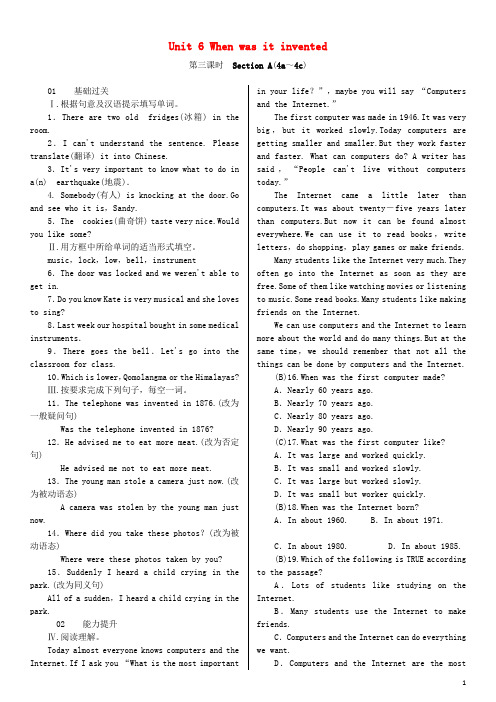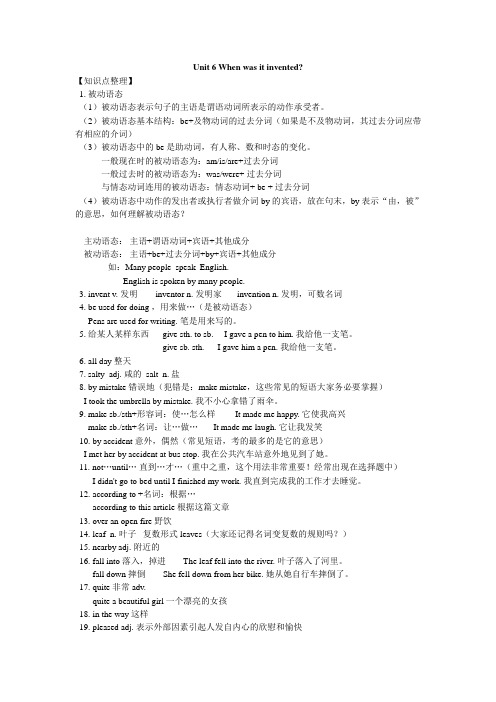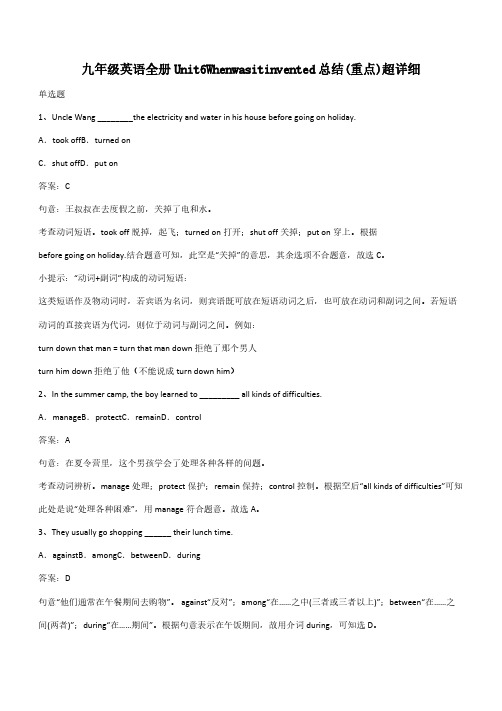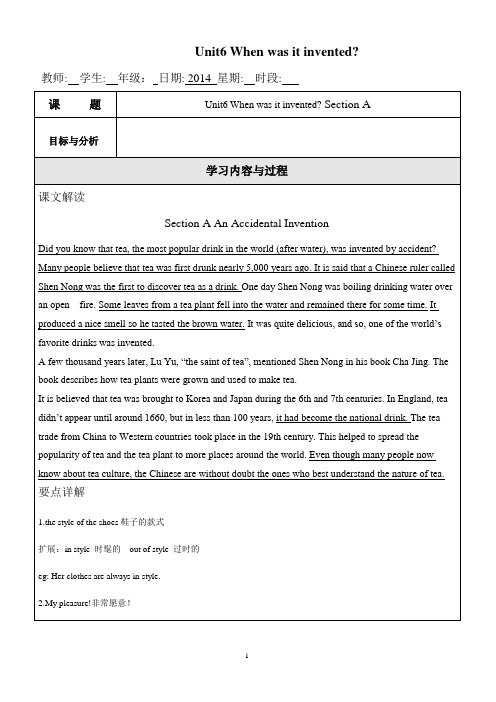Unit6Whenwasitinvented教材全解加课后练习讲解(附答案)
九年级英语全册 Unit 6 When was it invented(第3课时)习题(含答案)

Unit 6 When was it invented 第三课时Section A(4a~4c)01 基础过关Ⅰ.根据句意及汉语提示填写单词。
1.There are two old fridges(冰箱) in the room.2.I can't understand the sentence. Please translate(翻译) it into Chinese.3.It's very important to know what to do in a(n) earthquake(地震).4. Somebody(有人) is knocking at the door.Go and see who it is,Sandy.5.The cookies(曲奇饼) taste very nice.Would you like some?Ⅱ.用方框中所给单词的适当形式填空。
music,lock,low,bell,instrument6.The door was locked and we weren't able to get in.7.Do you know Kate is very musical and she loves to sing?8.Last week our hospital bought in some medical instruments.9.There goes the bell.Let's go into the classroom for class.10.Which is lower,Qomolangma or the Himalayas?Ⅲ.按要求完成下列句子,每空一词。
11.The telephone was invented in 1876.(改为一般疑问句)Was the telephone invented in 1876?12.He advised me to eat more meat.(改为否定句)He advised me not to eat more meat.13.The young man stole a camera just now.(改为被动语态)A camera was stolen by the young man just now.14.Where did you take these photos?(改为被动语态)Where were these photos taken by you?15.Suddenly I heard a child crying in the park.(改为同义句)All of a sudden,I heard a child crying in the park.02 能力提升Ⅳ.阅读理解。
Unit 6 When was it invented. Section A(解析版)

姓名:班级Unit 6 When was it invented?Section A一、单项选择1.—Is ________ here?—Yes. We are all ready.A.somebody B.neither C.everybody D.none【答案】C【详解】句意:——大家都到齐了吗?——是的。
我们都准备好了。
考查复合不定代词。
somebody某人;neither两者都不;everybody每个人;none没有;根据“Yes. We are all ready.”及语境可知,此处是问“每个人都到了吗”,故选C。
2.—Eric, you ________ to go to the teachers’ office just now. What’s up?—We aren’t allowed to bring phones to school. Em, but I broke the rule.A.told B.tell C.are told D.were told【答案】D【详解】句意:——埃里克,你刚才被告诉去教师办公室。
怎么了?——我们不准带手机上学。
嗯,但我违反了规则。
考查动词时态和被动语态。
根据“just now”可知,时态是一般过去时;埃里克被告诉去教师办公室,故为被动语态;即本句是一般过去时的被动语态,结构是was/were done。
故选D。
3.Our country, the PRC ______ in 1949.A.was found B.is foundedC.was founded D.has been found【答案】C【详解】句意:我们的祖国,中华人民共和国在1949年被建立。
考查一般过去时的被动语态。
find是动词,意为“发现”,过去分词为found;found是动词原形,意为“成立”,founded是其过去分词。
根据常识,中华人民共和国在1949年被建立,句子使用一般过去时被动语态。
九年级英语全册Unit6Whenwasitinvented知识点总结(超全)(带答案)

九年级英语全册Unit6Whenwasitinvented知识点总结(超全)单选题1、The hat is not the right ________ for me. I’d like a smaller one.A.sizeB.styleC.colourD.material答案:A句意:这顶帽子大小不适合我。
我想要小一点的。
考查名词辨析。
size大小,尺寸;style款式;colour颜色;material材料。
根据“I’d like a smaller one”可知,是尺寸不合适,故选A。
2、—Where do you think ________?—I guess they took it in Suzhou.A.was the photo takenB.the photo was takenC.did the photo takeD.the photo took答案:B句意:——你认为照片是在哪里拍的?——我想他们是在苏州拍的。
考查宾语从句。
本题动词“think”后跟宾语从句,从句用陈述句语序,故排除A、C;从句主语“the photo”与谓语动词“take”之间是被动关系,因此用被动语态,故选B。
3、— Look, Cindy. The flowers in our classroom come out in one night.— That's fantastic! They are beautiful and colorful. They________ nice. A.smellsB.smellC.soundsD.sound答案:B句意:——听着,辛迪。
我们教室里的花一晚上就开花了。
——太棒了!它们美丽多彩。
它们闻起来很香。
考查动词辨析和主谓一致。
本句主语They复数,可知谓语动词使用原形,可知排除A和D。
花应是闻起来很香,smell:闻起来;sound:听起来。
故选B。
Unit+6 When+was+it+invented 英语人教版九年级全一册

7.【湖南人文】You won't find it fun uunntitlil you visit the ancient town,Pho enix in the West of Hunan provBiblioteka nce for yourself.
三、英汉互译。 1.Without doubt,reading is especially important for a child in the process of growing up. 毫毫无无疑疑问问,,读读书书对对在在成成长长过过程程中中的的孩孩子子来来说说尤尤为为重重要要。。 2.珍妮在花园意外地找到了她的手表。 JJeennnnyyfofouundndhehrewr awtcahtchbybayccaicdceindteinnttihne tghaerdgeanr.den.
4.daily adj.每日的;日常的 daily相当于 everyday。daily life意为“日常生活”。 5.list的用法 (1)用作动词,意为“列表;列清单”。 (2)用作名词,意为“名单;清单”,其常用短语:make a list,意为“列清 单”。
6.the style of the shoes鞋的样式 style作名词,意为“样式;款式;方式;作风”。the style of…意为“……的 样式/风格”。
4.take place发生(指按计划发生)。 5.doubt的用法 (1)作动词时,意为“怀疑”,后跟if,whether或that从句。 (2)作名词时,意为“疑惑;疑问”,常用短语为without/no doubt(毫无疑问; 的确)。
6.remain的用法 (1)作实义动词,意为“逗留;不离去”。 (2)作连系动词,其后跟形容词、名词、分词等,意为“仍然是;保持(某 种状态)”。
九年级英语全册Unit6Whenwasitinvented知识点归纳总结(精华版)(带答案)

九年级英语全册Unit6Whenwasitinvented知识点归纳总结(精华版)单选题1、The fish you bought yesterday smells ________. You’d better throw it away. A.goodB.badC.wellD.badly答案:B句意:你昨天买的鱼闻起来坏了,你最好把它扔掉。
good意为“好”,是形容词, bad 意为“坏的”,是形容词,well意为“好”,是副词,badly意为“坏地”,是副词。
smells意为“闻起来”,是系动词,后接形容词作表语。
根据You’d better throw it away.可知,故选B项。
2、Another bridge over the Jialing River________last year.A.buildsB.builtC.is builtD.was built答案:D句意:去年在嘉陵江上又建了一座桥。
考查动词的时态和被动语态。
builds动词第三人称单数形式,修建;built是build的过去式或过去分词形式;is built是一般现在时的被动语态;was built是一般过去时的被动语态。
根据句意可知,该句的主语Another bridge与动词构成被动关系,应用被动语态,排除A和B;再由句中的时间last year可知,应用一般过去时。
故选D。
3、Last year Huai'an Flyover(高架) _________. Now it brings much convenience to people. A.finishedB.finishesC.is finishingD.was finished答案:D句意:去年淮安高架建成。
现在它给人们带来了很多便利。
考查动词的时态。
finished完成,动词的过去式;finishes动词的一般现在时的第三人称单数;is finishing动词的现在进行时;was finished动词的一般过去时态的被动。
Unit-6-When-was-it-invented知识点讲解及练习

Unit 6 When was it invented?【知识点整理】1. 被动语态(1)被动语态表示句子的主语是谓语动词所表示的动作承受者。
(2)被动语态基本结构:be+及物动词的过去分词(如果是不及物动词,其过去分词应带有相应的介词)(3)被动语态中的be 是助动词,有人称、数和时态的变化。
一般现在时的被动语态为:am/is/are+过去分词一般过去时的被动语态为:was/were+ 过去分词与情态动词连用的被动语态:情态动词+ be + 过去分词(4)被动语态中动作的发出者或执行者做介词by的宾语,放在句末,by 表示“由,被”的意思,如何理解被动语态?主动语态:主语+谓语动词+宾语+其他成分被动语态:主语+be+过去分词+by+宾语+其他成分如:Many people speak English.English is spoken by many people.3. invent v. 发明 inventor n. 发明家 invention n. 发明,可数名词4. be used for doing ,用来做…(是被动语态)Pens are used for writing. 笔是用来写的。
5. 给某人某样东西 give sth. to sb. I gave a pen to him. 我给他一支笔。
give sb. sth. I gave him a pen. 我给他一支笔。
6. all day 整天7. salty adj. 咸的 salt n. 盐8. by mistake 错误地(犯错是:make mistake,这些常见的短语大家务必要掌握)I took the umbrella by mistake. 我不小心拿错了雨伞。
9. make sb./sth+形容词:使…怎么样 It made me happy. 它使我高兴make sb./sth+名词:让…做… It made me laugh. 它让我发笑10. by accident 意外,偶然(常见短语,考的最多的是它的意思)I met her by accident at bus stop. 我在公共汽车站意外地见到了她。
九年级英语全册Unit6Whenwasitinvented总结(重点)超详细(带答案)

九年级英语全册Unit6Whenwasitinvented总结(重点)超详细单选题1、Uncle Wang ________the electricity and water in his house before going on holiday.A.took offB.turned onC.shut offD.put on答案:C句意:王叔叔在去度假之前,关掉了电和水。
考查动词短语。
took off脱掉,起飞;turned on打开;shut off关掉;put on穿上。
根据before going on holiday.结合题意可知,此空是“关掉”的意思,其余选项不合题意,故选C。
小提示:“动词+副词”构成的动词短语:这类短语作及物动词时,若宾语为名词,则宾语既可放在短语动词之后,也可放在动词和副词之间。
若短语动词的直接宾语为代词,则位于动词与副词之间。
例如:turn down that man = turn that man down 拒绝了那个男人turn him down 拒绝了他(不能说成turn down him)2、In the summer camp, the boy learned to _________ all kinds of difficulties. A.manageB.protectC.remainD.control答案:A句意:在夏令营里,这个男孩学会了处理各种各样的问题。
考查动词辨析。
manage处理;protect保护;remain保持;control控制。
根据空后“all kinds of difficulties”可知此处是说“处理各种困难”,用manage符合题意。
故选A。
3、They usually go shopping ______ their lunch time.A.againstB.amongC.betweenD.during答案:D句意“他们通常在午餐期间去购物”。
Unit6+When+was+it+invented教材全解加课后练习讲解附答案

Unit6 When was it invented?教师: 学生: 年级:日期: 2014 星期: 时段:课题Unit6 When was it invented? Section A目标与分析学习内容与过程课文解读Section A An Accidental InventionDid you know that tea, the most popular drink in the world (after water), was invented by accident? Many people believe that tea was first drunk nearly 5,000 years ago. It is said that a Chinese ruler called Shen Nong was the first to discover tea as a drink. One day Shen Nong was boiling drinking water over an open fire. Some leaves from a tea plant fell into the water and remained there for some time. It produced a nice smell so he tasted the brown water. It was quite delicious, and so, one of the world’s favorite drinks was invented.A few thousand years later, Lu Yu, ―the saint of tea‖, m entioned Shen Nong in his book Cha Jing. The book describes how tea plants were grown and used to make tea.It is believed that tea was brought to Korea and Japan during the 6th and 7th centuries. In England, tea didn’t appear until around 1660, but in le ss than 100 years, it had become the national drink. The tea trade from China to Western countries took place in the 19th century. This helped to spread the popularity of tea and the tea plant to more places around the world. Even though many people now know about tea culture, the Chinese are without doubt the ones who best understand the nature of tea. 要点详解1.the style of the shoes鞋子的款式扩展:in style 时髦的out of style 过时的eg: Her clothes are always in style.2.My pleasure!非常愿意!辨析pleasure / pleased / pleasantpleasure n. 高兴,愉悦My pleasure. /With pleasure / It’s a pleasure. --Thanks for helping me. –My pleasure. pleased adj 高兴的be pleased to do sth 乐于做某事be pleased with 对。
- 1、下载文档前请自行甄别文档内容的完整性,平台不提供额外的编辑、内容补充、找答案等附加服务。
- 2、"仅部分预览"的文档,不可在线预览部分如存在完整性等问题,可反馈申请退款(可完整预览的文档不适用该条件!)。
- 3、如文档侵犯您的权益,请联系客服反馈,我们会尽快为您处理(人工客服工作时间:9:00-18:30)。
Unit6 When was it invented? 教师: 学生: 年级:日期: 2014 星期: 时段:
辨析pleasure / pleased / pleasant
pleasure n. 高兴,愉悦My pleasure. /With pleasure / It’s a pleasure. --Thanks for helping me. –My pleasure. pleased adj 高兴的be pleased to do sth 乐于做某事be pleased with 对。
满意
Do not mention it. I am very pleased to help you.
The teacher was pleased with the students' performance.
pleasant adj 令人愉悦的Wish you a pleasant journey.
3.Think about how often it’s used in our daily lives.
Don’t you read the daily news in today’s newspaper?
daily作副词时,每日,每天The milkman comes daily to our house.
4.Well, you do seem to have a point…看来你说的确实有道理
have a point意为:有道理You have a point—It would be better to wait till tomorrow.
5.The pioneer of different inventions were listed there.
list 列表,列清单List them and you will never forget them.
list还可作名词意为:名单,清单I didn’t see his name on the list.
6.For example, it mentioned that the zipper was invented by Whitcomb Judson in 1893.
mention意为;提到,说到,其后可接that引导的宾语从句。
eg:He mentioned that the food was invented by a Chinese.
扩展:mention sth( to sb )
Nobody mentioned anything to me about it.
mention doing sth===== Whenever I mention havin dinner together, he says he’s too busy.
注意:Don’t mention it. Z主要来回答感谢,有时也用来回答道歉。
---Thank you very much. ----Don’t mention it
参考答案
单选1—5 CBCCC 6---10 BACCC 11—15 CABCA 16—20 CABBC 完型1—5 BCAAC 6—10 BCCBA
②over用作副词,意为结束Class is over.
③与over 相关的短语:
over there 在那边get over 客服go over 检查
all over the world 全世界over and over again 多次;反复地
5. Basketball was invented by a Canadian doctor named James Naismith, who was born in 1861.
Canadian adj---加拿大的;加拿大人的n---加拿大人
eg; Canadian culture is different from Chinese culture. Many of my friends are Canadians.
6. When he was a college teacher, he was asked to think of a game that could be played in the winter.
could be played 为情态动词的被动语态,结构为:情态动词+be+ done , 否定形式为: 情态动词+not+be+done All these must be finished in three years.
Kids should not be allowed to drink.
7. Dr Naismith divided the men in his class into two teams and taught them to play his new game.
divide…into 把…..分开;把…..划分为
The teacher divided our class into four groups.
divide up 分享The children divided up the candy among themselves.
8. At the same time, they need to stop the competing team from getting the ball into their own basket.
stop sb from doing sth 阻止某人做某事,相当于prevent sb from doing sth.
注意:在主动语态中两者中的from 可以省略,被动语态中不可省略
No one can stop us (from) carrying out the plan. The water must be prevented from being polluted by us.
9. Today, the popularity of basketball has risen around the world, with many young people dreaming of becoming famous players.
popularity n. 受欢迎,普及His books have grown in popularity recently.
rise vi 意为:增加,提高,上升,站起来The sun rises in the east and sets in the west.
辨析rise , raise
rise vi增加,上升,站起来,不能用于被动语态Meat prices are still rising.
raise vt 提高,增加,举起The man raised his voice and I heard what he said.
with+宾语+现在分词构成的复合结构在句中作伴随状语
With winter coming on, it’s time to buy warm clothes.
with+宾语+宾补构成with的复合结构,宾补除了可以是现在分词,还可以是介词短语、形容词、副词等。
He came in with a smile on his face.
dream of 意为:梦想,想象They dream of going to college.
扩展:dream作及物动词,后可接名词、代词或that从句作宾语
He dreamed a sweet dream.
10. Many young people look up to these basketball heroes and want to become like them.
look up to 钦佩,仰慕We all look up to the learned and modest professor.
He is a movie star whom I look up to.
look up to还意为:抬头看,仰望He looked up to the sky…….
11. These stars encourage young people to work hard to achieve their dreams.
encourage: 鼓励,激励常用结构:encourage sb to do sth
Parents should encourage children to do things by themselves.
achieve 实现,完成He could not achieve his goal.
辨析:achieve与come true
achieve 完成,实现主语通常是人
come true 实现,主语通常是梦想等
Unit6 SectionB答案
1. invented
2. adjustable
3. microwave
4. salty
5. mistake
6. accident
7. produced
8. pleasant
9. camera
单选
1-5 BDCCB 6-10 AADDD 11-15 DADAC 16-20 CABDC
完型
1-5 BCAAB 6-10 DCDCD
Unit6 课后作业
单选1-5 ACCAB 6-10 BBCAD
完型11-15 BADDB 16-20 CDCBC
21-25 daily hearing salty;salt popularity nearly。
